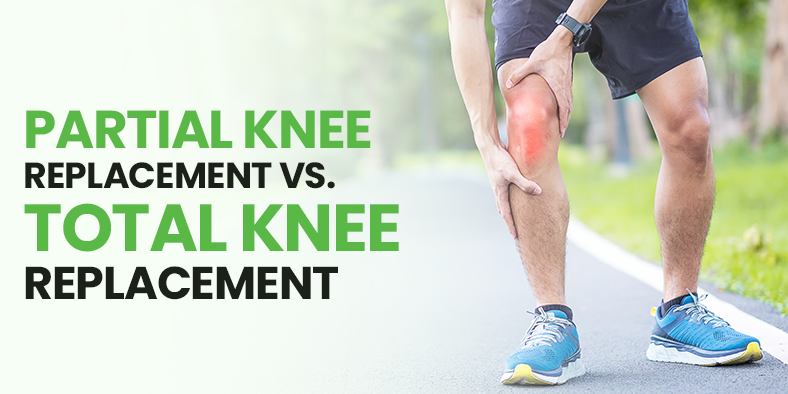We enjoy doing activities with a healthy body. Each and every body part plays an important role in the smooth functioning of the human body. Knee joints carry all the weight and help in the movement of the body. Because of a healthy knee, we can perform various activities like walking, running, and jumping. Individuals of all age groups are facing knee problems, it’s more common than before. There could be various reasons for knee pain such as accidents, aging and injury to the leg, and surgery for knee replacement to perform routine activities. Arthritis is a condition that causes pain and inflammation in joints. used for knee replacement. To make an informed decision patients need proper information about Partial Knee Replacement (PKR) and Total Knee Replacement (TKR) procedures. We will explore the differences, risks, advantages, and costs of these surgeries.
Why Knee Surgery?
Patients with osteoarthritis, rheumatoid arthritis, or other joint diseases find difficulty in walking, climbing stairs, and running. Doctors might suggest knee replacement surgery if the condition is worse, in this surgery an artificial implant will be used by the surgeon to replace damaged knee parts. After surgery patients regain their movement, get relief from pain and they are capable of doing regular activities. There are two types of knee replacement surgeries, Partial knee replacement (PKR) and Total knee replacement surgery (TKR)
Partial Knee Replacement (PKR)
In the Partial Knee Replacement procedure only the damaged part of the knee joint would be replaced with an artificial implant, this process is also known as unicompartmental knee replacement. The human knee structure has three compartments: the medial (inside), lateral (outside), and patellofemoral (front). When performing PKR doctors aim to replace the damaged section, without disturbing parts of the knee.
Benefits of Partial Knee Replacement:
- Less Intrusive: PKR is a less intrusive procedure compared to TKR. Because of the smaller incision, it doesn’t cause much trauma to the surrounding tissues.
- Faster Recovery: Patients recover quickly because it’s less invasive. Those undergoing PKR can start normal activities including walking, driving, and sports activities sooner because of fast recovery compared to TKR surgery patients.
- Protection of Healthy Tissue: PKR protects the healthy parts of the knee; it gives a natural feeling after surgery with fewer incisions.
- Minimal Complications: In PKR surgery risk of complications like blood clots and infections is less compared to TKR.
Disadvantages of Partial Knee Replacement:
- Not for Everyone: Patients with limited arthritis or damage in one part of the knee opt for PKR. In case of other damage, parts of knee PKR surgery is not the right option.
- Short-Term Solution: If arthritis progresses to other parts of the knee patients may eventually need a total knee replacement because earlier only part of the knee was replaced.
- Longevity of Implant: PKR implant has a chance to last a long time but their durability would be less than TKR implants, especially for very active patients.
What is Total Knee Replacement (TKR)?
In the Total Knee Replacement procedure, the entire knee joint is replaced with an artificial implant. Arthritis patients with effects on the entire knee joint are recommended for TKR surgery.
Benefits of Total Knee Replacement:
- Complete Solution: TKR provides a solution to the whole knee area problem, this surgery is a more definitive solution for individuals with severe knee damage.
- Long-Lasting Results: TKR surgery implants are designed in a way to last long to 15-20 years or more, they are durable and make it a long-term solution for many patients.
- Suitable for Broad Range: Patients with severe or widespread TKR, this procedure is suitable for a broader range of patients.
Disadvantages of Total Knee Replacement:
- More Invasive: Total Knee Replacement is an extensive surgery with large and deep incisions, it disrupts more tissues. Patients take longer to recover after TKR surgery.
- Surgical Complications: Since TKR is a more extensive surgery, there is a higher chance of complication than PKR. Including infection, blood clots, nerve damage, ligament, and artery damage. Sometimes Infection spreads at the incision site or deeper in the tissue and may require further surgery. Blood clotting is common in TKR, especially in the leg, but sometimes travels to the lungs and could be life-threatening. Doctors prescribe blood thinning medication after surgery to prevent blood clots. Also, there is a chance of nerve damage which causes numbness, weakness, and pain.
- Less Natural Feeling: Many patients report that the knee doesn’t feel natural after TKR surgery compared to PKR, however, it can vary from person to person.
Cost of Knee Replacement Surgeries
Costing for Knee replacement surgeries varies and depends on various factors including the location, hospitals, the surgeon’s experience, and whether patients have insurance or not. Let’s understand the cost of both the surgeries:
Cost of Partial Knee Replacement:
- In India: Considering various factors, the cost of PKR in India is comparatively lower than in other countries, ranging from INR 2,50,000 to INR 4,00,000 (approximately $3,000 to $5,000).
Cost of Total Knee Replacement:
- In India: Total Knee replacement surgery is more invasive and expensive than PKR and the cost comes to around INR 3,50,000 to INR 5,00,000 (around $4,000 to $6,500).
Please note that these figures can vary depending upon the location, age, and health condition of patients, hospitals, and surgeons, and additional costs such as initial consultations, post-surgery care, and medications before and after surgery should be considered.
Decision to Choose Surgery
Choosing between Partial Knee Replacement and Total Knee Replacement depends on the patient’s health, age, activity, and knee damage. Here are some points to consider when making your decision:
- Degree of Damage: Choosing Knee replacement surgery mostly depends on arthritis or damage, in cases of single-compartment knee damage Partial Knee Replacement is the best option. In severe or widespread damage conditions where activity level is hindered, Total Knee replacement seems an appropriate option.
- Recovery Time: Though recovery time shouldn’t be the reason to choose between PKR and TKR in some cases faster recovery is important for patients due to their nature of job and lifestyle, PKR might be more suitable for such individuals. However, it is advisable to choose a long-term solution to avoid the need for another surgery and TKR may be the best solution for that.
- Age and Health Condition: PKR is more suitable for younger and more active patients to preserve their natural knee. Older patients with heavy damage and facing problems in day-to-day life might benefit from the comprehensive approach of TKR.
- Costing: Financial factors play an important role in making a decision, not everyone can afford expensive treatment. Patients consider choosing the right surgery according to their budget, TKR is more expensive than PKR, though it provides long-lasting results.
- Surgeon’s Recommendation: In most cases, orthopaedic surgeon’s recommendation drives the decision to choose surgery. They assess your particular condition and advise on the best course of action based on their expertise and experience.
Conclusion
Both Partial Knee Replacement and Total Knee Replacement offer effective solutions for relieving knee pain and improving mobility. Understanding the differences between these procedures, including their benefits, drawbacks, and costs, can help you make an informed decision about which surgery is right for you. Always consult with your doctor and consider your personal circumstances before proceeding with either option. With the right choice, you can look forward to a future with reduced pain and improved quality of life.
If you are exploring the best Ortho to perform surgery or give expert consultation. Consider visiting Dr. Siddharth Aggarwal, an Arthroscopy Sports Surgeon. He is a board-certified orthopaedic doctor and surgeon who specializes in Sports Injuries and Arthroscopic Surgeries of the Knee, Shoulder, and Ankle. He has outstanding experience in providing treatment for various trauma and joint replacement conditions. Throughout his career, Dr. Siddharth Aggarwal has gained the trust and respect of his patients and peers due to his outstanding professionalism, considerable knowledge, and impressive skills.
FAQ
1. What are the limitations of a partial knee replacement?
A partial knee replacement can be life-changing, but there are still a few things to keep in mind. Since only part of your knee is replaced, you might not have the same range of motion as someone with a full replacement. You may also be more limited in high-impact activities like running or jumping. It’s important to take care not to overstrain the knee, as the other parts of the joint are still natural and may wear down over time. Your doctor will guide you on the best ways to maintain function and avoid putting too much stress on the knee.
2. When is a partial knee replacement needed?
A partial knee replacement is typically recommended when one area of your knee is damaged—usually due to arthritis or injury—but the rest of the knee is still in pretty good shape. It’s a great option if the damage is isolated to just one part of the knee (medial, lateral, or patellofemoral) and you’re still active.
3. Is it better to have partial or full knee replacement?
Whether a partial or full knee replacement is better depends on the extent of damage in your knee. If the damage is isolated to just one part of the knee, a partial knee replacement can be a great option—it’s less invasive, has a quicker recovery time, and preserves more of your natural knee. However, if arthritis or damage affects multiple parts of your knee, a full replacement may be necessary. Your doctor will help you weigh the pros and cons of each based on your condition, lifestyle, and goals.
4. What not to do after partial knee replacement?
After a partial knee replacement, there are a few things you’ll want to avoid in the early stages to ensure the best recovery. First, try to steer clear of high-impact activities like running, jumping, or heavy lifting, as these can put too much strain on your new knee. Also, avoid twisting or pivoting movements that could destabilize the joint. While it’s important to stay active and do your rehab exercises, don’t overdo its low and steady is the name of the game.
5. How long is a partial knee replacement good for?
A partial knee replacement can last anywhere from 10 to 20 years, depending on your age, activity level, and how well you take care of your knee. Generally, if you’re more active, your knee might wear down a bit faster, while if you’re more cautious and follow post-op care, you might enjoy a longer-lasting knee. Over time, there’s always a chance that the other parts of your knee may wear out, and a full knee replacement could eventually be needed. But with proper care, many people can enjoy a good quality of life.


